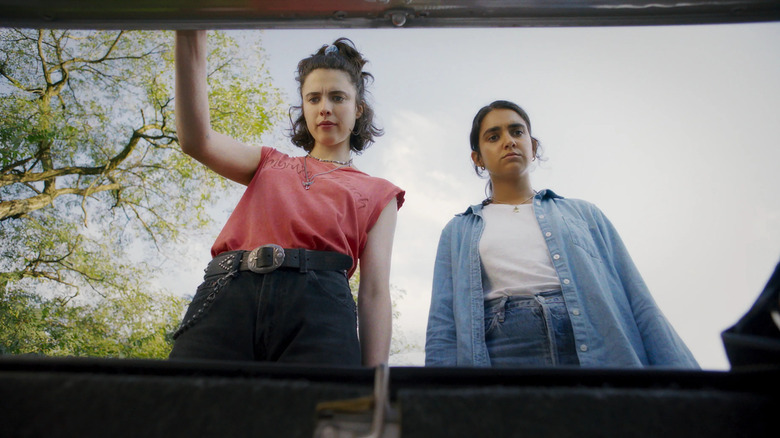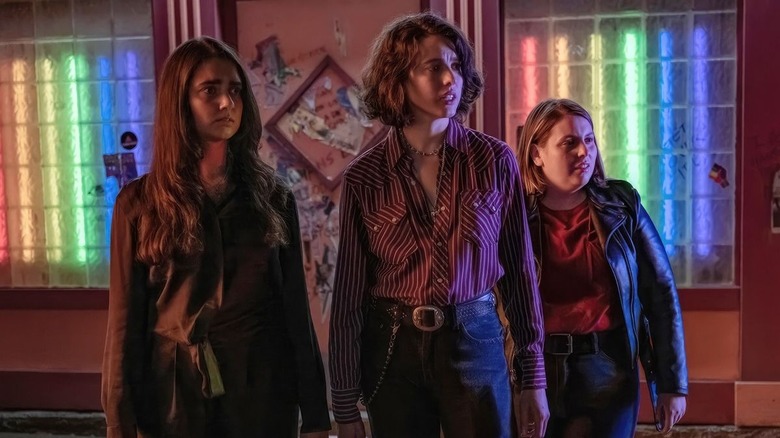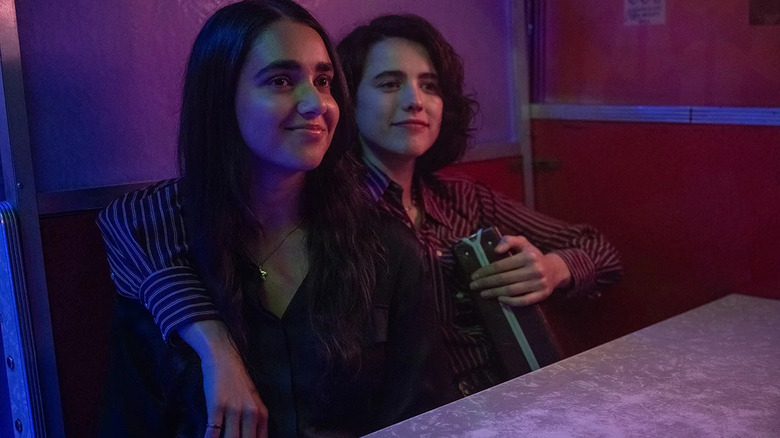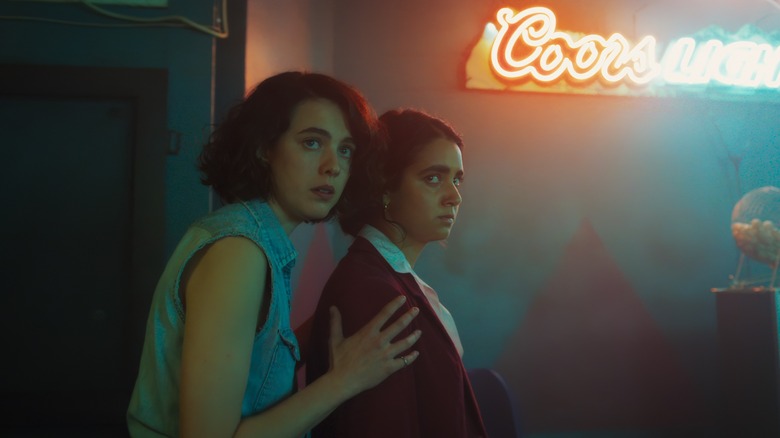If You're A Coen Brothers Fan, You Also Love Tricia Cooke (Even If You Don't Know It)
The release of "Drive-Away Dolls" has been marked by most of the trades as the first solo directorial feature of Ethan Coen, following his brother Joel's 2021 outing with "The Tragedy of Macbeth." And sure, it's a catchy headline to acknowledge that one-half of one of cinema's greatest directorial partnerships is stepping out on his own, but that doesn't tell the full story. For one thing, Ethan Coen already made his solo directorial debut with the documentary "Jerry Lee Lewis: Trouble in Mind." More importantly, "Drive-Away Dolls" may have Coen listed as the solo director, but if you ask him, this was yet another co-directed project, but this time with his wife and longtime Coen Bros. editor, Tricia Cooke.
Cooke first worked with the Coens as an editor on "Miller's Crossing" fresh out of film school, seeking out the job not because they were the esteemed directors of "Blood Simple" and Raising Arizona" fame, but because she was looking for a job and had some connections to the production. She hit it off with Ethan right away and her editorial eye was keen, so she would subsequently work on "Barton Fink," "The Hudsucker Proxy," "Fargo," "The Big Lebowski," "O Brother, Where Art Thou?," and "The Man Who Wasn't There," as well as the aforementioned Jerry Lee Lewis documentary. Moviemaking is a collaborative art form, but few would argue with the fact that films live and die by the hand of an editor, making Tricia Cooke the Coen's secret weapon.
Point blank: if you're a fan of the Coen Brothers, you're a fan of Tricia Cooke, and "Drive-Away Dolls" is just the start of her endlessly cool career.
Tricia Cooke is where the girls are
Tricia Cooke has been married to Ethan Coen since the early 1990s and the two raise children together, but make no mistake, Cooke is a lesbian. If this doesn't make sense in your head, that's something for you to work through on your own time and dime, but Cooke is and has always been a lesbian, and queerness has been central to her work outside of the Coen Bros. In 2003 she and Jennifer Arnold ("TableTop," "P-Valley," "Shameless") co-directed a hybrid comedy documentary called "Where the Girls Are" about Dinah Shore Weekend, an annual lesbian pool party in Palm Springs. It won the Outstanding Narrative Short Film at Outfest in 2003 but is now ridiculously hard to track down.
Equally as difficult to get your hands on is the 2008 short she co-directed, "Don't Mess With Texas," alongside Carrie Schrader ("The Founders") from a script she co-wrote with Ethan Coen. It's about two cocksure lesbians who get in over their heads at a roadside Texas diner and certainly sounds like the spiritual forerunner to "Drive-Away Dolls," a movie Cooke has been trying to get made since the 1990s. Initially, "Drive-Away Dykes," as it was originally titled, was supposed to be directed by Allison Anders, the brilliant filmmaker behind "Gas Food Lodging" and "Mi Vida Loca." But despite Anders also being one of the directors of the anthology film "Four Rooms" (alongside Quentin Tarantino and Robert Rodriguez), no one would finance the project.
Suppose you're wondering why Cooke has only ever co-directed short films and why it took decades for "Drive-Away Dolls" to make it to the big screen. In that case, I kindly implore you to head on over to the ol' Google machine and learn a bit about gender inequality in the Hollywood studio system, lesbophobia in America, or just read any comment section on Facebook of any article I've ever written about a queer film or filmmaker. That should catch you up to speed.
Drive-Away Dolls is a Tricia Cooke movie
A sentiment that I keep seeing is that the film embraces the "zanier" side of Coen Bros. movies, implying that based on "The Tragedy of Macbeth" and "Drive-Away Dolls," it's clear which brother is the "serious" one and which is the "silly" one. And while there may be truth to the statement, it erases Cooke's influence on their comedy films. I think about "The Big Lebowski," a comedy film so well-loved that it has inspired its own religion, and how so many comedy films are built in the edit bay. Letting a shot linger for too long or cutting away from a reaction too quickly can completely kill a joke, so as much as the Coen Bros. obviously deserve credit for their screenplay and directorial style, their editing collaboration with Tricia Cooke is just as important. And that editing style is apparent in "Drive-Away Dolls," paired beautifully with the cinematography of Ari Wegner ("Eileen," "The Power of the Dog," "Zola").
So much of "Drive-Away Dolls" is an extension of Cooke's DNA, with the story pulling from her own lived experiences in the lesbian bar scene of the late '90s and early '00s. In an interview with Moviemaker Magazine, Cooke explained that the title "Drive-Away Dykes" came first, with the script following after. "It was like old-fashioned Hollywood," Coen explained. "We started with the title and wrote the movie to fit the title." The name change was at the behest of the studio, as well as acknowledging the word "dyke" is often used as a slur outside of the community. (Ex: I am a proud dyke but that doesn't mean some stranger on the street can call me one.)
And while I don't doubt Ethan Coen has been immersed in the LGBTQIA+ community for decades, "Drive-Away Dolls" is so obviously the brainchild of a queer person not just in identity, but in experience. This is not an attempt to discredit or discount the efforts of Ethan Coen, but merely highlight that this film could not exist without Tricia Cooke.
Labels aren't as important as people
I attended a Q&A with Cooke and Coen moderated by Tracy E. Gilchrist from The Advocate, where Coen wanted it to be explicitly clear that we as the audience knew that Cooke was the co-director regardless of how the Director's Guild of America classified the film. I'm paraphrasing here, but the sentiment was that as Coen was already a member of the DGA, neither of them "really gave a s**t" about who was officially listed. It's a bit like how the two don't care how other people view their marriage or the "validity" of Cooke's lesbianism. Cooke's impact on this film is undeniable, from the story elements to the actual production.
Cooke worked with intimacy coordinator Chelsea Pace on choreographing the sex scenes, the lesbian bars are inspired by her former haunts the Cattyshack (now closed) and the Cubbyhole (still alive!), and even determined the placement of a particularly hilarious visual gag where Beanie Feldstein's character removes a wall-mounted dildo she shared with her ex-girlfriend (played by Margaret Qualley) after their breakup. And again, no shade to Ethan Coen (I cannot stress enough that I love his work), but these are decisions that just can't be made by someone who isn't a dyke. During the Q&A, Cooke talked about how when they were first developing the film, the world wasn't ready for a silly caper with leads that happened to be lesbians because studio-made queer films were primarily interested in trauma or coming-out stories. So while it's a shame it took so many years to finally see "Drive-Away Dolls" on the big screen, at least we know we're seeing Cooke and Coen's vision as intended — dyke power and all.



